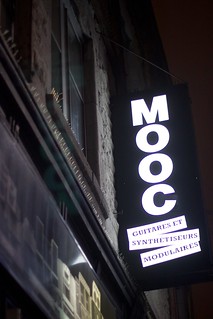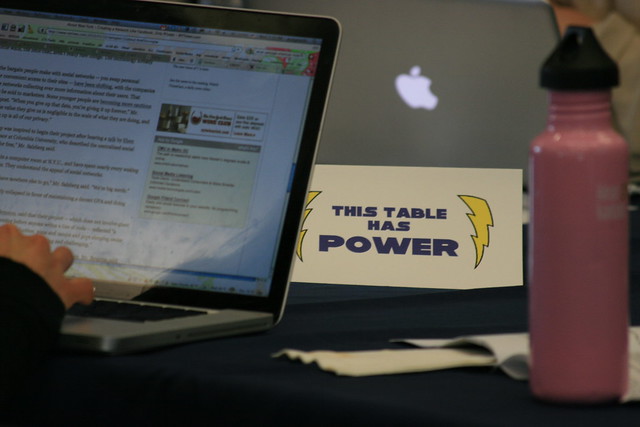I think you know MOOCs have arrived when the aftershocks of the University of Virginia fiasco (an excellent article summing it up thus far in the New Republic by Kevin Carey here) reverberate on your home campus so quickly. UMW’s President Rick Hurley, who has brought stability and focus to a UMW community that has seen its own Presidential woes over the last 4 or 5 years, has called together a meeting of folks to be debriefed on what’s going on in this realm, and how we are positioning UMW in terms of online learning. As luck would have it, it just so happens that we have a few people on campus who’ve been thinking long and hard on this stuff.
Turns out we have been doing a number of great things in terms of teaching and learning technologies for a number of years. We’ve imagined and implemented a open source web-based publishing platform that features a variety of work happening around the UMW learning community with UMW Blogs. What’s more, we’ve made this work openly available to anyone on the web to interact with. We’ve built a community of people at UMW that grok the web as an integral part of understanding the relationship between teaching, learning, and a campus-based liberal arts experience moving forward. What’s more, online learning isn’t supplanting anything at UMW, it is part of an ongoing academic culture that is exploring the online space as a platform to build community, share our work freely, and grant access to the world through the simple act of defaulting to open. What we are doing here is experimenting with how web-based networks inform the relationships amongst teaching, research, and scholarship that have yet to be fully imagined.
Sometimes it’s a luxury to be flying under the radar as a small, public university because you aren’t so caught up with the purity of your brand, political jockeying for power (though that still happens, just not on the same scale), or pissing off major donors. With such freedom you can actually create the conditions wherein experimentation and innovation can take root, and that’s how UMW came to many of its discoveries in educational technology, most recently the Massive Open Online Course (MOOC) known as ds106. Unlike the overwrought reaction of UVA’s Board of Visitors to the future of web-mediated learning, the shape of things at UMW was born of curiosity, openness, and an iterative approach to development. Not unlike how it came to just about everything its done voer the last 7 or 8 years. From the beginning we were encouraged to do our work openly online, research the state of the field, read widely and voraciously, and share the process in turn. And we did.
So in 2008 when Stephen Downes, George Siemens and Dave Cormier created the first MOOC—we were paying attention, we were discussing the implications, and eventually we started designing our own. In terms of MOOCs, I always thought the massive was overstated until Stanford’s AI course hit last Fall, I had to do a double take when I learned over 100,000 thousand people had signed up. Whether or not we understand it as good or bad, the ability to even imagine orchestrating an online learning experience for more than 100,000 people in a semi-organized fashion is mind blowing. Even if a small fraction of them, say 10%, finish the course and learn something about Artificial Intelligence (and I think much more than that did) that’s roughly 5,000 more people than go to UMW all told. That’s a different layer of scale for classrooms and global networks, and it’s a game right now that can only be played on that scale by the most prominent celebrity professors.
But what about the rest of us? What might UMW bring to the MOOC if not an idea of celebrity professors and brand recognition? I would argue we can and should create an experience that taps into what’s unique about UMW: a small, rather affordable by US standards, 4-year public liberal arts campus. The idea comes from a conversation with the great Michael Wesch who was talking about the implications of a campus-wide version of ds106 for all K-State students. A kind of game/class embedded in the campus experience but open and accessible to anyone on the web. This is exactly right and the the vision of Ed Parkour, spaces where the web becomes part of the built environment of the campus and the experimentation for teaching and learning happens there as a result of the community. This is where UMW could shine—we can’t play the same game as Harvard, Stanford, MIT, etc., and we shouldn’t even try. We’re a small teaching college and we’re pretty good at it, highlight the best teaching happening around campus though an interactive experience the campus community can join in. How fun would it be to imagine such experiences as not a way to gut the campus experience, but as a way to re-imagine it entirely. ds106 has not done this campus-wide approach at UMW just yet, but what it has done is prove that a classroom experience can evolve into a community that transcends the idea of any one course.
What would truly enable other schools like UMW to escape the potentially vicious circle of celebrity faculty is to battle it with a connected and engaged community. That will be its own kind of gold, a vision of a student who understands and shapes the nature of these online connections with their own domain and web hosting while still remaining grounded in the campus life is a more realistic vision of the future. Why would UMW react to either or when it is so well suited for both? Why has this discussion become so linear? Why has the idea of online learning become divorced from the experience on the ground, why has it come to be understood as an almost unrelated entity almost entirely divorced from the campus community all together? These are just a few of my ideas on the matter as we prepare to meet with UMW’s president over the next couple of weeks. It is unfortunate that it took the incompetence of UVA’s Board of Visitors to become the reason for this meeting, but at the same time I am really glad we are finally having it—even if it is 18 months after ds106 broke the MOOC sound barrier ![]() UMW (and its wide ranging network of associates) has a ton to offer to this conversation, and using these various technologies and approaches to promote engagement, build community, and conceptualize these new means of communication are shaping our culture is essential to the 21st century citizen—-but like everything else at the university, it needs to be approached with an open mind, freedom, and some sense of possibility rather than crisis.
UMW (and its wide ranging network of associates) has a ton to offer to this conversation, and using these various technologies and approaches to promote engagement, build community, and conceptualize these new means of communication are shaping our culture is essential to the 21st century citizen—-but like everything else at the university, it needs to be approached with an open mind, freedom, and some sense of possibility rather than crisis.





